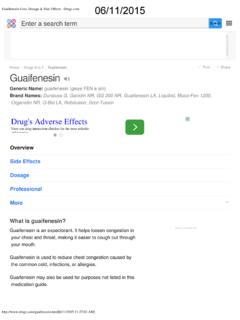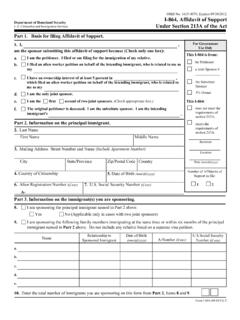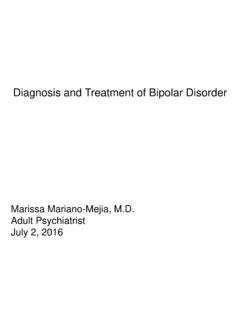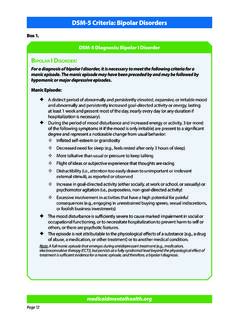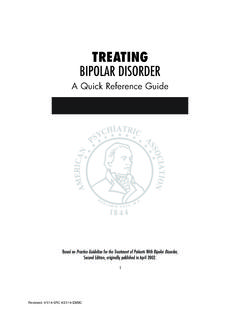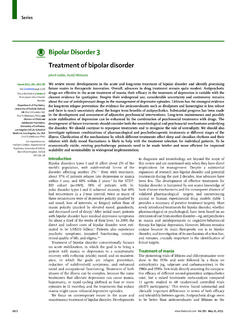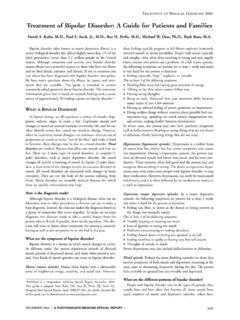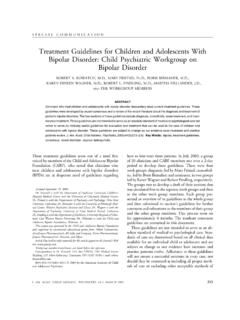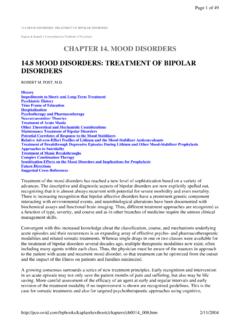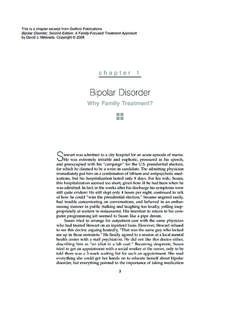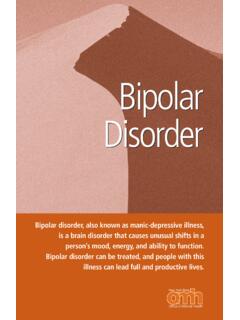Transcription of Bipolar disorder Treatments and drugs - Diseases and ...
1 Bipolar disorder Treatments and drugs - Diseases and Conditions - Mayo Clinic Menu Search By Chris Tighe at 2:15 pm, Nov 26, 2014. Appointments at Mayo Clinic Request Appointment Diseases and Conditions Bipolar disorder SECTIONS. Treatments and drugs By Mayo Clinic Staff Bipolar disorder requires lifelong treatment , even during periods when you feel better. treatment is usually guided by a psychiatrist skilled in treating the condition. You may have a treatment team that also includes psychologists, social workers and psychiatric nurses. The primary Treatments for Bipolar disorder include medications; individual, group or family psychological counseling (psychotherapy); or education and support groups. Hospitalization. Your doctor may have you hospitalized if you are behaving dangerously, you feel suicidal or you become detached from reality (psychotic).
2 Initial treatment . Often, you'll need to begin taking medications to balance your moods right away. Once your symptoms are under control, you'll work with your doctor to find the best long-term treatment . Continued treatment . Maintenance treatment is used to manage Bipolar disorder on a long-term basis. People who skip maintenance treatment are at high risk of a relapse of symptoms or having minor mood changes turn into full-blown mania or depression. Substance abuse treatment . If you have problems with alcohol or drugs , you'll also need substance abuse treatment . Otherwise, it can be very difficult to manage Bipolar disorder . Medications A number of medications are used to treat Bipolar disorder . If one doesn't work well for you, there are a number of others to try.
3 Your doctor may suggest combining medications for maximum effect. Medications for Bipolar disorder include those that prevent the extreme highs and lows that can occur with Bipolar disorder (mood stabilizers) and medications that help with depression or anxiety. [11/26/2014 2:15:29 PM]. Bipolar disorder Treatments and drugs - Diseases and Conditions - Mayo Clinic Medications for Bipolar disorder include: Lithium. Lithium (Lithobid, others) is effective at stabilizing mood and preventing the extreme highs and lows of certain categories of Bipolar disorder and has been used for many years. Periodic blood tests are required, since lithium can cause thyroid and kidney problems. Common side effects include restlessness, dry mouth and digestive issues. Anticonvulsants. These mood-stabilizing medications include valproic acid (Depakene, Stavzor), divalproex (Depakote) and lamotrigine (Lamictal).
4 The medication asenapine (Saphris) may be helpful in treating mixed episodes. Depending on the medication you take, side effects can vary. Common side effects include weight gain, dizziness and drowsiness. Rarely, certain anticonvulsants cause more serious problems, such as skin rashes, blood disorders or liver problems. Antipsychotics. Certain antipsychotic medications, such as aripiprazole (Abilify), olanzapine (Zyprexa), risperidone (Risperdal) and quetiapine (Seroquel), may help people who don't benefit from anticonvulsants. The only antipsychotic that's specifically approved by the Food and drug Administration (FDA) for treating Bipolar disorder is quetiapine. However, doctors can still prescribe other medications for Bipolar disorder . This is known as off-label use.
5 Side effects depend on the medication, but can include weight gain, sleepiness, tremors, blurred vision and rapid heartbeat. Weight gain in children is a significant concern. Antipsychotic use may also affect memory and attention and cause involuntary facial or body movements. Antidepressants. Depending on your symptoms, your doctor may recommend you take an antidepressant. In some people with Bipolar disorder , antidepressants can trigger manic episodes, but may be OK if taken along with a mood stabilizer. The most common antidepressant side effects include reduced sexual desire and problems reaching orgasm. Older antidepressants, which include tricyclics and MAO inhibitors, can cause a number of potentially dangerous side effects and require careful monitoring. Symbyax.
6 This medication combines the antidepressant fluoxetine and the antipsychotic olanzapine. It works as a depression treatment and a mood stabilizer. Symbyax is approved by the FDA specifically for the treatment of Bipolar disorder . Side effects can include weight gain, drowsiness and increased appetite. This medication may also cause sexual problems similar to those caused by antidepressants. Benzodiazepines. These anti-anxiety medications may help with anxiety and improve sleep. Examples include clonazepam (Klonopin), lorazepam (Ativan), diazepam (Valium), chlordiazepoxide (Librium) and alprazolam (Niravam, Xanax). Benzodiazepines are generally used for relieving anxiety only on a short- term basis. Side effects can include drowsiness, reduced muscle coordination, and problems with balance and memory.
7 Finding the right medication Finding the right medication or medications for you will likely take some trial and error. This requires patience, as some medications need weeks to months to take full effect. Generally only one medication is changed at a time so your doctor can identify which medications work to relieve your symptoms with the least bothersome side effects. This can take months or longer, and medications may need to be adjusted as your symptoms change. Side effects improve as you find the right medications and doses that work for you, and your body adjusts to the medications. [11/26/2014 2:15:29 PM]. Bipolar disorder Treatments and drugs - Diseases and Conditions - Mayo Clinic Medications and pregnancy A number of medications for Bipolar disorder can be associated with birth defects.
8 Use effective birth control (contraception) to prevent pregnancy. Discuss birth control options with your doctor, as birth control medications may lose effectiveness when taken along with certain Bipolar disorder medications. If you plan to become pregnant, meet with your doctor to discuss your treatment options. Discuss breast-feeding with your doctor, as some Bipolar medications can pass through breast milk to your infant. Psychotherapy Psychotherapy is another vital part of Bipolar disorder treatment . Several types of therapy may be helpful. These include: Cognitive behavioral therapy. This is a common form of individual therapy for Bipolar disorder . The focus of cognitive behavioral therapy is identifying unhealthy, negative beliefs and behaviors and replacing them with healthy, positive ones.
9 It can help identify what triggers your Bipolar episodes. You also learn effective strategies to manage stress and to cope with upsetting situations. Psychoeducation. Counseling to help you learn about Bipolar disorder (psychoeducation) can help you and your loved ones understand Bipolar disorder . Knowing what's going on can help you get the best support and treatment , and help you and your loved ones recognize warning signs of mood swings. Family therapy. Family therapy involves seeing a psychologist or other mental health provider along with your family members. Family therapy can help identify and reduce stress within your family. It can help your family learn how to communicate better, solve problems and resolve conflicts. Group therapy. Group therapy provides a forum to communicate with and learn from others in a similar situation.
10 It may also help build better relationship skills. Other therapies. Other therapies that have been studied with some evidence of success include early identification and therapy for worsening symptoms (prodrome detection) and therapy to identify and resolve problems with your daily routine and interpersonal relationships (interpersonal and social rhythm therapy). Ask your doctor if any of these options may be appropriate for you. Transcranial magnetic stimulation This treatment applies rapid pulses of a magnetic field to the head. It's not clear exactly how this helps, but it appears to have an antidepressant effect. However, not everyone is helped by this therapy, and it's not yet clear who is a good candidate for this type of treatment . More research is needed. The most serious potential side effect is a seizure.
